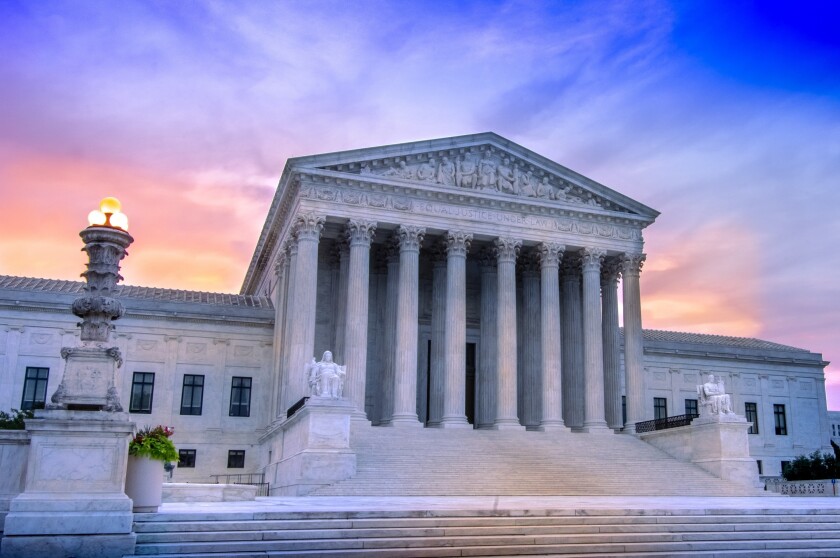The USPTO hasn’t had very much luck when it’s gone head-to-head with free speech issues in recent years.
The agency refused to register the term 'The Slants' because the Lanham Act prohibited disparaging trademarks. The US Supreme Court then overturned the USPTO when it determined that this provision was unconstitutional in the 2017 case Matal v Tam.
The trademark office also rejected the term ‘Fuct,’ based on the part of the Lanham Act that barred the registration of immoral or scandalous marks. But SCOTUS again went against the USPTO and struck down this provision in the 2019 dispute Iancu v Brunetti.
Now, the intellectual property agency seeks yet again to pit a provision of the Lanham Act that limits what can be registered as a trademark against the first amendment – and the high court should sit up and take note.
The USPTO filed a petition for writ of certiorari last Friday, January 27, asking SCOTUS to review a case involving its rejection of the phrase ‘Trump Too Small’ for use on t-shirts.
The office rejected the application in 2018 on the basis that Section 1052(c) of the Lanham Act prohibits the registration of a trademark that consists of or comprises a name, portrait or signature identifying a living person.
But the Court of Appeals for the Federal Circuit overturned this decision in February 2022, arguing that it violated the first amendment.
I’m not ready to comment on how the court should rule at this point. But I do know that a SCOTUS review will provide helpful guidance to trademark lawyers and applicants.
Better guidance
One reason I’d like to see the court take up this case is because it would provide more direction for lawyers and applicants on what’s eligible for trademark registration.
Lawyers always want to provide clear advice to their clients, and being able to point to a SCOTUS ruling will be useful. In fact, the more rulings they can point to the better.
There’s also a possibility that this case could provide more guidance to legislators on the right of publicity, which would be welcome.
The right of publicity protects individuals against the misappropriation of their name or likeness for commercial benefit. As it stands, there’s no federal law in the US that recognises this right.
But, as the examining attorney who rejected the mark argued, Section 1052(c) of the Lanham Act was meant to protect rights of privacy and publicity related to the designations that identify living persons.
Congress should enact a federal law that recognises the right of publicity. If it does, the tension between such right and free speech issues will surely come into play.
Section 1052(c) isn’t the exact same thing as a right of publicity, of course. As the USPTO pointed out in its petition, this provision doesn’t limit the use of these applied-for marks in commerce. It just denies them the benefit of a federal trademark registration.
But legislators could at least take note of the court’s potential analysis to increase the chances that a federal right of publicity wouldn’t violate the first amendment. Judges and lawyers could also potentially cite the case in future disputes that pit free speech issues and the right of publicity against each other.
What’s to lose?
Another reason the court should take this case on is because we don’t have a lot to lose either way.
That may seem like an odd reason, but hear me out.
IP lawyers often want SCOTUS to review their issues and then are sometimes not very happy with the end result.
Regardless of whether you trust the court to make these free speech decisions – there’s not a lot of harm it can do here. Wouldn’t it be nice to have a case where things will be okay either way?
If the court overrules the Federal Circuit, the law will just be what the USPTO thought it was.
People will still be free to mock politicians or any person all they like – they just won’t be able to build a registered brand using their name. That doesn’t feel like some draconian assault on free speech.
If the decision is upheld, there may be more marks on the register that incorporate the names of living persons. But the USPTO will still have plenty of other reasons to reject the applications.
For example, slogans and phrases can be rejected on the basis that they’re merely ornamental, meaning that consumers would think of them as just being decorations and that they fail to function as being sources of goods.
Rejections based on failure to function aren’t exactly beloved among trademark lawyers, of course. Critics have argued that such rejections are inconsistent and increase uncertainty among applicants and lawyers – although that’s an issue for another article.
My point is that the USPTO can still limit these marks even if they’re not banned per se.
This case presents a great opportunity for SCOTUS to start a conversation, provide some useful guidance, and all without people losing much sleep at night.
Let’s hope the court takes its chance.











